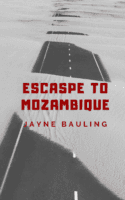The border post on the South African side is called Lebombo. On the Mozambiquan side, it’s Ressano Garcia. I’m a bit nervous, going through, but it all goes smoothly.
“So quick,” I comment, and Uncle Moreira laughs.
“Just don’t try travelling at Christmas or Easter,” he says.
The little car sounds like it’s working hard as it rattles and roars along the Maputo Corridor. From the back seat I stare out at big plots of land, all walled off even if there are no buildings on them. It’s not exactly an inspiring landscape.
“Wow! Vodacom really went a bit overboard here,” I say, seeing the logo everywhere, including on a lot of these strange walls.
I know I sound critical, but my uncle just laughs, while Noemia turns to smile at me from the front passenger seat.
“You find it strange. We understand,” she says.
I don’t want her sweet understanding. I don’t want to be here, don’t want this interruption to my life.
“We have a bit of time to go through Maputo so you can see something of the city,” Uncle Moreira says.
“Maybe only a quick stop at the harbour today, but we can come again another day, with my friends,” Noemia says.
When we reach Maputo, I think maybe this isn’t going to be so bad after all. It’s massive, and its afternoon streets feel so alive, crowded with pedestrians and vehicles, including these yellow and green taxis. It’s vibey and exciting. In different districts we pass teeming pavement shops and cafés, in others elite walled properties. There are smart, ultra-modern buildings in a few obviously wealthy areas, but there are also lots of ruined buildings that you can see were once beautiful. Some of these buildings look burnt out or bombed.
“From the war,” Uncle Moreira says. “You’ll notice the old colonial buildings look different from the colonial architecture back home. This is the Portuguese legacy. You’ll find an incredible fusion of cultures in Mozambique.”
We park at the harbour and get out. Looking out over the water, my mood is still improving.
“Baia de Maputo. That’s the bridge they’re building to Catembe,” Noemia says, pointing at the structure. “But there has always been the ferry. It goes when it’s full. See, over there?”
A car slows to a stop near where we’re standing, and everything that happened at home starts rushing back into my mind. Have BK Nxumalo’s people followed me here?
I tense as a young man jumps out, but all he does is empty the last few fries out of a takeaway carton and stand watching as a house crow flaps down and eats them greedily.
Somehow that makes me feel good.
Next we stop at this cute little mall to buy snacks for the road, and then we’re leaving Maputo, heading north.
My spirits sink again.
“What exactly do you guys do in Manhica?” I ask.
“We grow cashew nuts for sale to the shops,” Noemia answers. “But Papa also has a job on the sugar cane plantations. It’s far for him to go every day. Mama works in a supermarket.”
It sounds quite rural. Not my scene. I look back at the city receding from view, and feel a surge of anger and resentment.
***
Tell us what you think: Is Chansenga having these mood swings because she is still traumatised after her abduction?


